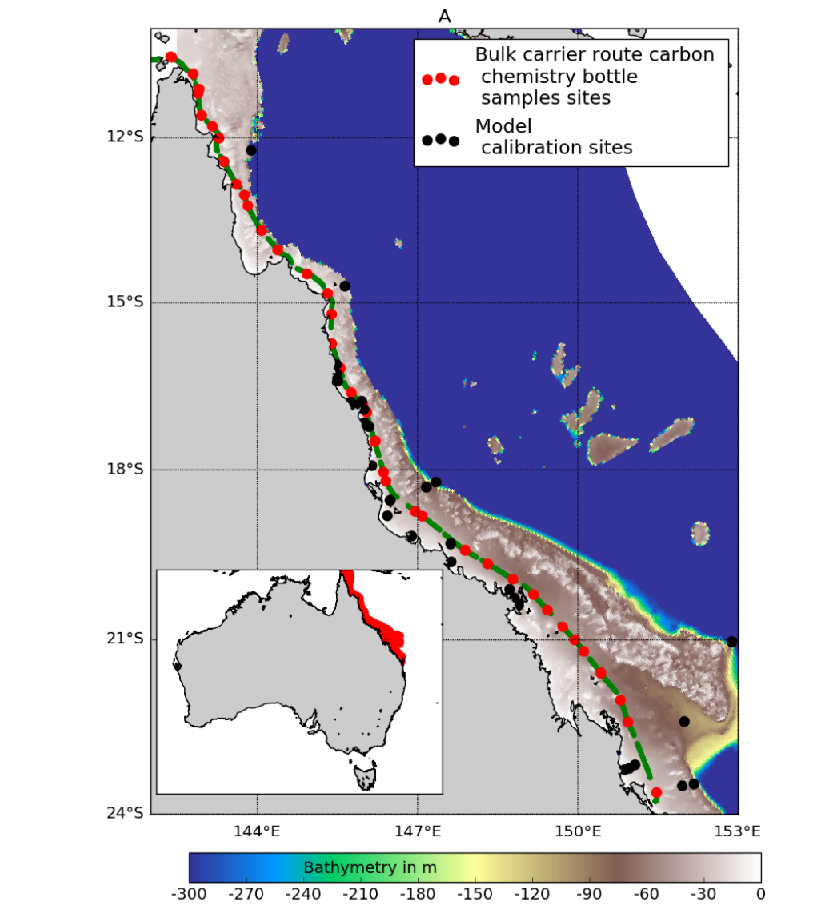Jun 9 2021
According to a new study, injecting an alkalinizing agent into the ocean along the stretch of the Great Barrier Reef could help offset a decade's worth of ocean acidification, specifically at the current rate of anthropogenic carbon emissions.
 Map of the Great Barrier Reef. Bathymetry is overlain. A: Gladstone 579 Weipa (Queensland, Australia) bulk carrier route (green) and location of in-situ observations (red and black dots). Image Credit: IOP Publishing.
Map of the Great Barrier Reef. Bathymetry is overlain. A: Gladstone 579 Weipa (Queensland, Australia) bulk carrier route (green) and location of in-situ observations (red and black dots). Image Credit: IOP Publishing.
The study, conducted by CSIRO Oceans and Atmosphere, Hobart, utilized a high-resolution model that was particularly designed for the Great Barrier Reef region to investigate the effect of artificial ocean alkalinization on water acidity in the Great Barrier Reef.
The new study is based on the use of present-day shipping infrastructure to inject an alkalinizing agent into the ocean. This alkalinizing agent could also be regarded as an acceleration of the chemical weathering of minerals via natural processes. The study results were recently published in the IOP Publishing journal Environmental Research Letters.
As a globally significant coral reef system, the Great Barrier Reef supports a diverse and productive ecosystem. But today, it is facing unparalleled stress from tropical cyclones, ocean warming, ocean acidification, marine pests, and nutrient and sediment runoff.
Among these stressors, ocean acidification poses one of the most major threats to the long-term viability of the reef. This is because it affects the corals’ ability to build and repair their rigid structures and recover from bleaching events.
Now, a wide range of promising intervention concepts and technologies are being considered in an attempt to counteract the declining health of the coral reef ecosystems. The goal is to improve the resilience of the coral reef ecosystem and minimize environmental pressures.
These methods include direct and active environmental engineering strategies, like artificial ocean alkalinization, a method used to mitigate or offset the changes linked to ocean acidification and enhance the uptake of oceanic carbon.
In essence, in artificial ocean alkalinization, sources of alkalinity, like olivine, are added to seawater. This “reverses” the shift in the carbon chemistry equilibrium process that takes place when anthropogenic carbon is absorbed by oceans. Olivine — an abundant mineral resource — is already being mined close to the Great Barrier Reef.
The study is aiming to analyze the reduction of the effect of ocean acidification on a scale that has been ignored, until now.
The majority of the artificial ocean alkalinization modeling studies to date have focused on the potential for alkalinization as a carbon dioxide removal technique. Few studies have explored the role of alkalinization with a focus on offsetting the changes associated with ocean acidification at a regional scale.
Study Authors
In this study, the researchers employed a newly designed 4 km-resolution coupled hydrodynamic-biogeochemical model, tested for the Great Barrier Reef region. And for the first time, this model enabled the simulation of the effect of alkalinity injection on individual reefs along the stretch of the ~2000-km long Great Barrier Reef.
The study results demonstrated that when the alkalinity agent is discharged from an existing shipping lane, it causes the resulting de-acidification to end up in almost the entire Great Barrier Reef.
The new report explains the innovative and timely deployment of the regional model as a testbed for an ocean acidification mitigation method. The researchers also noted that, by assuming the use of prevailing shipping infrastructure (a bulk carrier discharging 30, 000 tons per day) as the alkalinity delivery mechanism, artificial ocean alkalinization would mitigate or offset the projected acidification by 10 years on 250 reefs.
Doing so would help sequester 35,000 tons of carbon in the ocean every year, or 0.0001% of the present global CO2 emissions.
Journal Reference:
Mongin, M., et al. (2021) Reversing ocean acidification along the Great Barrier Reef using alkalinity injection. Environmental Research Letters. doi.org/10.1088/1748-9326/ac002d.